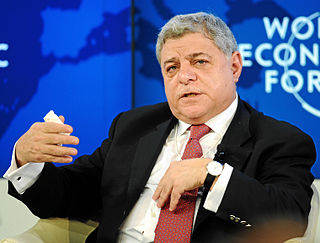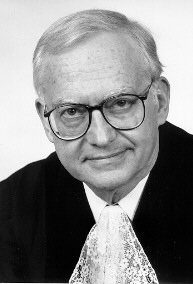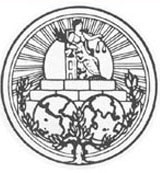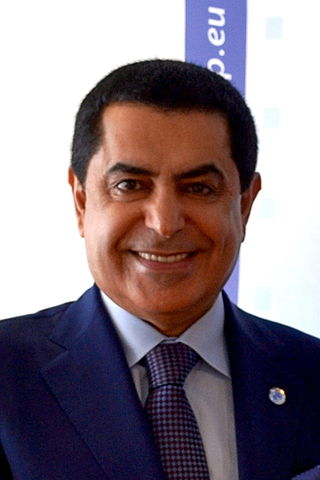
Awn Shawkat Al-Khasawneh is a Jordanian former politician and judge who was the 39th Prime Minister of Jordan, serving from October 2011 to April 2012. He was also formerly a judge of the International Court of Justice.
United Nations Security Council Resolution 94 was adopted on 29 May 1951. In the resolution, the Security Council noted with regret the death of International Court of Justice Judge José Philadelpho de Barros e Azevedo on 7 May 1951 and decided that the election to fill the vacancy would take place during the sixth session of the General Assembly. The Council further decided that this election should take place prior to the regular election which was to be held at the same session to fill the five vacancies which were to occur owing to the expiration on 5 February 1952 of the mandates of five of the ICJ's members.
United Nations Security Council Resolution 99 was adopted on 12 August 1953. Noting that International Court of Justice Judge Sergei Golunsky had submitted his resignation due to ill health and that a vacancy would exist on the Court, the Council resolved that an election to fill the vacancy would take place during the eighth session of the General Assembly.
United Nations Security Council Resolution 105, adopted on July 28, 1954, after noting with regret the death of Judge Sir Benegal Narsing Rau, a Judge on the International Court of Justice, the Council decided that the election to fill the vacancy would take place during the ninth session of the General Assembly, and that that election would take place after the regular election to be held at the same session to fill the five vacancies which would come up on February 5, 1955.

United Nations Security Council Resolution 117, adopted on September 6, 1956, after the death of Judge Hsu Mo of the International Court of Justice the Council decided that the election to fill the vacancy for the rest of Judge Mo's term would take place during the eleventh session of the General Assembly.

United Nations Security Council Resolution 208, adopted on August 10, 1965, after noting with regret the death of Judge Abdel Hamid Badawi, a judge on the International Court of Justice, the Council decided that the election to fill the vacancy would take place during the twentieth session of the General Assembly.

United Nations Security Council resolution 627, adopted unanimously on 9 January 1989, after noting the death of International Court of Justice (ICJ) President Nagendra Singh on 11 December 1988, the council decided that elections to the vacancy on the ICJ would take place on 18 April 1989 at the Security Council and at the General Assembly's 43rd session.

United Nations Security Council resolution 805, adopted unanimously on 4 February 1993, after noting the death of International Court of Justice (ICJ) judge Manfred Lachs on 14 January 1993, the Council decided that elections to the vacancy on the ICJ would take place on 10 May 1993 at the Security Council and at a meeting of the General Assembly during its 47th session.

United Nations Security Council Resolution 1914, adopted unanimously on 18 March 2010, after noting the resignation of International Court of Justice (ICJ) judge Shi Jiuyong and that the vacancy must be filled in accordance with the Statute of the ICJ, the Council decided that the election to fill the vacancy would take place on 29 June 2010 at a meeting of the Security Council and at a meeting of the General Assembly at its 64th session.

United Nations Security Council resolution 951, adopted without a vote on 21 October 1994, after noting the death of International Court of Justice (ICJ) judge Nikolai Konstantinovitch Tarassov on 28 September 1994, the Council decided that elections to the vacancy on the ICJ would take place on 26 January 1995 at the Security Council and at a meeting of the General Assembly during its 49th session.

United Nations Security Council resolution 980, adopted without a vote on 22 March 1995, after noting the resignation of International Court of Justice (ICJ) judge Sir Robert Yewdall Jennings which would take effect on 10 July 1995, the council decided that elections to the vacancy on the ICJ would take place on 12 July 1995 at the security council and at a meeting of the General Assembly during its 49th session.

United Nations Security Council resolution 1018, adopted unanimously on 7 November 1995, after noting the death of International Court of Justice (ICJ) judge Andrés Aguilar-Mawdsley on 24 October 1995, the Council decided that elections to the vacancy on the ICJ would take place on 28 February 1996 at the Security Council and at a meeting of the General Assembly during its 50th session.

United Nations Security Council resolution 1278, adopted without a vote on 30 November 1999, after noting the resignation of International Court of Justice (ICJ) judge Stephen M. Schwebel taking effect on 29 February 2000, the council decided that elections to the vacancy on the ICJ would take place on 2 March 2000 at the security council and at a meeting of the General Assembly during its 54th session.

United Nations Security Council Resolution 1926, adopted unanimously on June 2, 2010, after noting the resignation of International Court of Justice (ICJ) judge Thomas Buergenthal with effect from September 6, 2010. The Council decided that the election to fill the vacancy would take place on September 9, 2010 at a meeting of the Security Council and at a meeting of the General Assembly.

United Nations Security Council resolution 1361, adopted without a vote on 5 July 2001, after noting the resignation of International Court of Justice (ICJ) judge Mohammed Bedjaoui taking effect on 30 September 2001, the council decided that elections to the vacancy on the ICJ would take place on 12 October 2001 at the security council and at a meeting of the general assembly during its 56th session.

United Nations Security Council resolution 1571, adopted without a vote on 4 November 2004, after noting the resignation of International Court of Justice (ICJ) judge Gilbert Guillaume taking effect on 11 February 2005, the council decided that elections to the vacancy on the ICJ would take place on 15 February 2005 at the security council and at a meeting of the General Assembly during its 59th session.

The sixty-sixth session of the United Nations General Assembly opened on 13 September 2011 at 15:00 and was presided over by former Qatari permanent representative to the UN Nassir Abdulaziz Al-Nasser. The session ended on 18 September as al-Nasser symbolically passed the gavel to the president of the next session, Vuk Jeremic.
The 2011 International Court of Justice election began on 10 November 2011 at United Nations Headquarters in New York City. In the set of triennial elections, the General Assembly and the Security Council concurrently elect five judges to the Court for nine-year terms, in this case beginning on 6 February 2012. From the eight candidates, the five winners were Giorgio Gaja (Italy), Hisashi Owada (Japan), Peter Tomka (Slovakia), Xue Hanqin (China) and Julia Sebutinde (Uganda).

The Sixty-third session of the United Nations General Assembly was the session of the United Nations General Assembly that ran from 16 September 2008 to 14 September 2009.

United Nations Security Council resolution 2638 was adopted without vote on 22 June 2022. After noting with regret the death of International Court of Justice (ICJ) judge Antônio Augusto Cançado Trindade on 29 May 2022, the Council decided that elections to the vacancy on the ICJ would take place on 4 November 2022 at the Security Council and at a meeting of the General Assembly during its 77th session.














